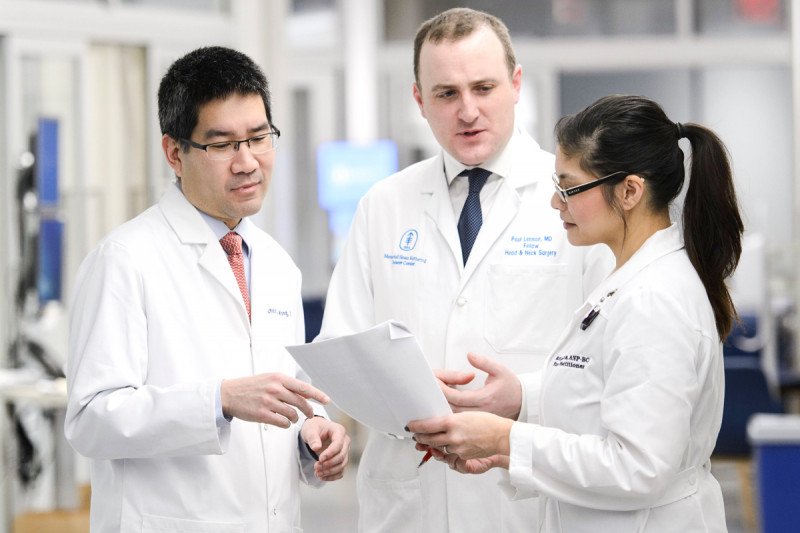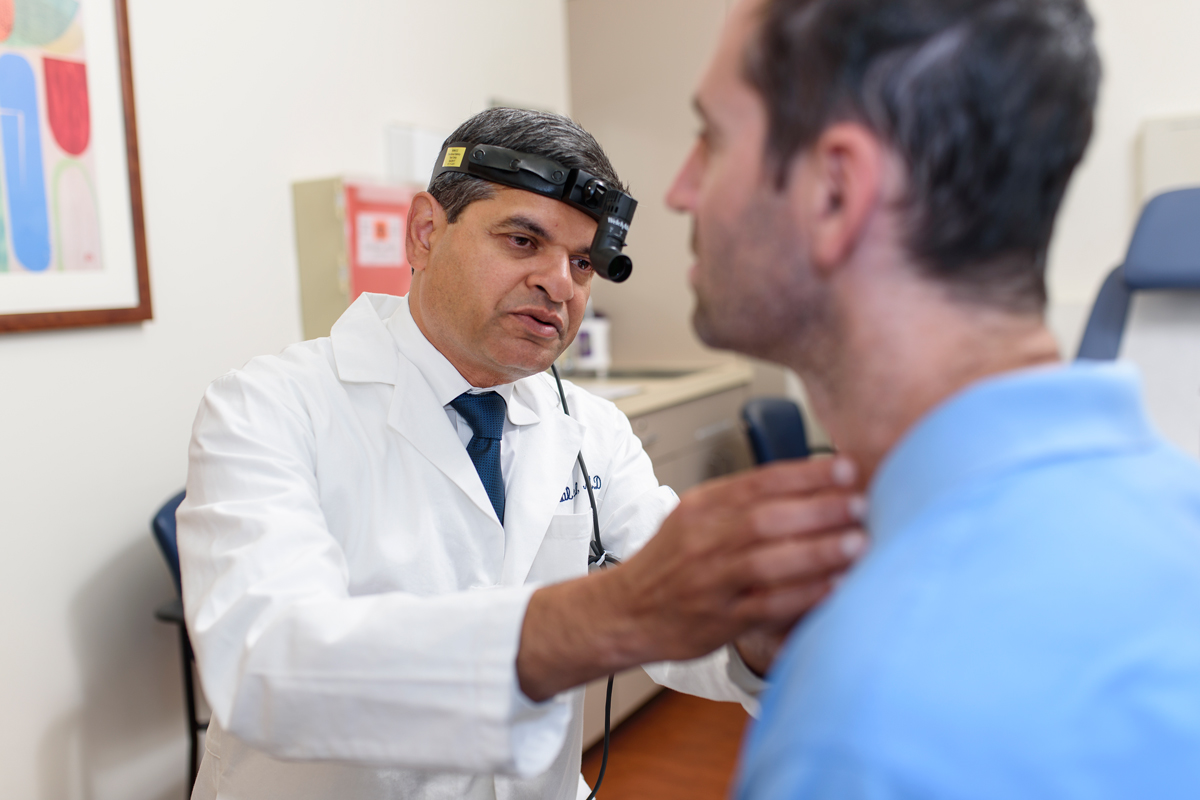
If you have a head and neck cancer, or are helping a loved one learn about head and neck cancer treatment, you’ve come to the right place. We want to help you understand your surgical options to get the best outcome possible. This information is meant to guide you through your journey and prepare you for the decisions you and your doctors will make together.
Memorial Sloan Kettering is a leading center for head and neck cancer surgery. Our highly trained head and neck surgeons place a strong emphasis on completely removing the cancer while preserving quality of life. Achieving this delicate balance is our goal. It allows us to provide you with the best option for controlling the disease while being highly attentive to your ability to speak, eat, and swallow.
Our head and neck surgeons are nationally and internationally recognized for our expertise in:
- thyroid surgeries
- oral cancer surgeries
- surgeries to remove tumors in the nasal cavity and sinuses
- surgeries to remove tumors in the parathyroid
- throat cancer operations, including laryngectomies
- salivary gland operations, including parotidectomy
- complex skin cancer surgeries
Learn more about head and neck cancer surgery and how MSK’s expertise can benefit you or your loved one.
Minimally Invasive Head and Neck Surgery
Our head and neck surgeons use minimally invasive techniques whenever appropriate. In many cases, people recover more quickly when treated with minimally invasive surgery compared with traditional open surgery.
Transoral Laser Microsurgery (TLM)
Our surgeons may use transoral laser microsurgery to remove tumors of the voice box (larynx) or oropharynx through the mouth. The surgeon uses a microscope to see the cancer and then aims a special laser beam at the tumor to remove it. This approach involves no external incisions. The surgeon is able to avoid damaging speech and swallowing functions. TLM is often performed on an outpatient basis with a safe, fast-acting anesthetic that wears off quickly after the procedure.
Transoral Robotic Surgery (TORS)
Transoral robotic surgery (TORS) is a minimally invasive surgery to remove oropharyngeal cancer, including tonsil cancer. It combines three-dimensional imaging with tiny robotic surgical instruments. Together these tools allow surgeons access tumors through the mouth. The approach does not require any external incisions.
Speech and swallowing ability are more likely to be preserved with this minimally invasive approach. Recovery times are much faster than after open surgery. Many people need to stay in the hospital for only a day or two. Memorial Sloan Kettering’s surgeons have extensive experience with TORS. We know how to select the people whose cancer can be cured with this technique.
Skull-Base Surgery for Head and Neck Cancer
MSK’s head and neck surgeons are part of a multidisciplinary clinic that cares for people with skull-base tumors. Our surgeons are highly experienced in using a minimally invasive technique called transnasal endoscopy to remove sinonasal cancer, nasopharyngeal tumors, and other skull-base tumors. The risk of complications with this technique is very low. The surgery leaves no visible scar.
Skull-base surgery is very complex. It requires an experienced surgical team, like the one at MSK. Our team includes a head and neck surgeon, a plastic surgeon, and a neurosurgeon. Our surgeons can use intraoperative MRI during skull-base surgeries. This technology enables us to view real-time images of a tumor during a procedure. It makes operations safer and more effective. It gives us the ability to ensure that the tumor is completely removed while patients are still under anesthesia.
Advanced Head and Neck Cancer
Our surgeons have particular expertise in removing complicated tumors in hard-to-reach or delicate areas of the head and neck region. These surgeries can require extensive planning. MSK’s head and neck surgeons have a great deal of experience in performing them. Often, we may team up with surgeons from different specialties to address the complexities of advanced disease, such as invasive thyroid cancer. We are exploring several new imaging techniques that detect and illuminate cancer cells during the operation. This will enable surgeons remove tumors while sparing as much normal tissue as possible.
A Commitment to Quality of Life
MSK’s head and neck surgeons are committed to preserving your quality of life by making sure you get just the right amount of treatment.
While planning your treatment, we use a combination of imaging and vast clinical experience to make decisions about the extent of the surgery required. We work with radiologists who specialize in head and neck imaging to make an exquisitely precise road map to the tumor.
During surgery, MSK’s head and neck surgeons use meticulous surgical techniques to preserve the delicate areas in and around the head and neck. For example, state-of-the-art nerve-monitoring technology allows us to identify and preserve any nerves that may be near the tumor. Our surgeons also use specialized techniques to preserve your appearance, speech, or ability to swallow, taste, or hear.
Advanced Reconstruction Surgery for Head and Neck Cancer

MSK’s plastic and reconstructive surgeons work closely with your head and neck surgeon to give you a coordinated, seamless experience. Reconstruction of bones and other structures is often possible as part of the procedure to remove a tumor. This approach can spare you from a separate operation.
Reconstructive surgery for head and neck cancer usually involves the transplantation of tissue from one area of the body to the affected area. This typically involves a microsurgical approach called free tissue transfer. A plastic surgeon transfers a piece of your own tissue, along with the blood vessels, to the area where the cancer was removed in order to repair the surgical site. Tiny sutures (stitches) are used to connect the small blood vessels of the tissue to the blood vessels in the neck. That allows the transferred tissue to thrive and heal properly. The type of tissue transfer you have depends on the size and location of the primary tumor.
When the jawbone must be removed, we may be able to use a sophisticated software program originally developed for architects (called AutoCAD) to precisely map and measure bone to create a new jaw. We can also replace skin and reconnect nerves and blood vessels so you can get back to looking and functioning like your normal self.
Our reconstructive surgeons have also developed highly specialized techniques for treating facial paralysis so people with parotid gland tumors can regain movement after treatment.
Dental Care
Head and neck cancer and its treatment can affect your teeth and other areas of your mouth. Our dental oncologists and maxillofacial prosthodontists work closely with the other members of your care team to perform dental procedures.
Before treatment begins, the team meets with you to ensure that you are in good dental health and to address any problems that need attention right away. After treatment, we take X-rays to look for any new problems.
The dental team also creates customized prosthetics for people who need them. These include dental implants, obturators for the roof of the mouth, and other custom devices used to help repair the jawbone or tongue.
In some cases, our dental prosthodontists may be able to place dental implants during the surgery to remove the cancer or during reconstructive surgery. This means you won’t need a separate implant procedure.
Patient Satisfaction
Our most important focus is patient satisfaction. It all starts with a conversation about your individual surgery and goals. For this, we’ve developed the Face-Q questionnaire. This important tool helps us measure your satisfaction with your appearance and quality of life.
Speech and Swallow Therapy
MSK’s speech pathologists are experts in helping you recover from any problems related to your ability to speak or swallow. We will be here for you before, during, and after your treatment to help address any problems. Our goal is to achieve the best continuity of your care.
Before you start treatment, a speech pathologist will usually perform a baseline assessment. This measures your swallowing, speech, voice, and mouth movements. You will learn how these abilities may change as a result of treatment. Your speech pathologist works with your care team to make a plan for your care during and after treatment. We will help you improve and maintain your swallowing, speech, voice, and mouth movements.
Why choose Memorial Sloan Kettering for head and neck cancer surgery?
As the world’s largest nonprofit cancer center, we provide leading-edge head and neck cancer surgery. For many people, we can offer innovative procedures with an emphasis on form and function. Our full-time staff of head and neck surgeons has extensive experience and expertise in all types of head and neck cancer surgery. We are at the forefront of developing advanced surgical techniques that can preserve or restore function. This gives the nearly 1,900 people treated by our Head and Neck Surgery Service each year the best possible outcomes. In addition, we offer speech and swallowing evaluations to people with mouth cancer, throat cancer, and salivary gland cancer to help manage any side effects of care.
Choose MSK for head and neck cancer surgery because we offer:
- Compassionate care from a team of experts. More than 80 head and neck doctors work closely with other specialists and nurse practitioners to help the people we care for get the best results before, during, and after head and neck cancer surgery.
- Convenient locations. Many of the head and neck cancer specialists and therapies you need are available at our locations in New Jersey, as well as in Westchester and on Long Island. If you’re traveling from out of town for your care, we’ve negotiated special discounted rates for our patients at nearby hotels.
- Unparalleled depth of expertise. Memorial Sloan Kettering is home to the world’s longest-standing head and neck surgery program. We’ve set global standards of care. Many of the world’s leading head and neck surgeons have trained with us.
- A powerful commitment to patient satisfaction. To continuously improve outcomes and quality of life for people with head and neck cancer, MSK developed FACE-Q. This questionnaire measures our patients’ satisfaction with their facial appearance. Responses help us continually improve how we deliver care.
We’re available 24 hours a day, 7 days a week


